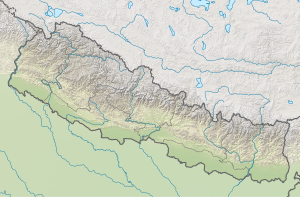Champadevi (Nepali: चम्पादेवी गाउँपालिका) is a rural municipality (gaunpalika) out of seven rural municipality located in Okhaldhunga District of Province No. 1 of Nepal. There are a total of 8 municipalities in Okhaldhunga in which 1 is urban and 7 are rural.
Champadevi
चम्पादेवी गाउँपालिका | |
|---|---|
| Coordinates: 27°18′N 86°17′E / 27.30°N 86.28°E | |
| Province | Province No. 1 |
| District | Okhaldhunga |
| Wards | 10 |
| Established | 10 March 2017 |
| Government | |
| • Type | Rural Council |
| • Chairperson | Mr.Nawaraj KC (NC) |
| • Vice-chairperson | Mrs. Dilamaya Magar |
| Area | |
• Total | 126.91 km2 (49.00 sq mi) |
| Population (2011) | |
• Total | 18,613 |
| • Density | 150/km2 (380/sq mi) |
| Time zone | UTC+5:45 (Nepal Standard Time) |
| Headquarter | Kalikadevi |
| Website | official website |
According to Ministry of Federal Affairs and Local Developme Champadevi has an area of 126.91 square kilometres (49.00 sq mi) and the total population of the municipality is 18613 as of Census of Nepal 2011.[1][2]
Palapu, Kalikadevi, Phediguth, Phulbari, Sagarmatha, Bilandu and Raniban, Sagarmatha which previously were all separate Village development committee merged to form this new local level body. Fulfilling the requirement of the new Constitution of Nepal 2015, Ministry of Federal Affairs and Local Development replaced all old VDCs and Municipalities into 753 new local level body (Municipality).[1]
The rural municipality is divided into total 10 wards and the headquarter of this newly formed rural municipality is situated in Kalikadevi.[1]
Demographics
editAt the time of the 2011 Nepal census, Champadevi Rural Municipality had a population of 18,661. Of these, 74.9% spoke Nepali, 12.3% Magar, 6.5% Tamang, 4.5% Newar, 1.1% Sherpa, 0.2% Maithili, 0.1% Baram and 0.4% other languages as their first language.
In terms of ethnicity/caste, 41.9% were Chhetri, 14.0% Magar, 6.8% Tamang, 6.3% Newar, 6.0% Hill Brahmin, 5.2% Sunuwar, 3.9% Damai/Dholi, 3.4% Kami, 3.1% Sarki and 9.4% others.
In terms of religion, 90.7% were Hindu, 7.9% Buddhist, 0.6% Christian, 0.2% Prakriti, 0.1% Muslim and 0.5% others.[3]
References
edit- ^ a b c "स्थानीय तहहरुको विवरण". www.mofald.gov.np/en. MoFALD. Archived from the original on 31 August 2018. Retrieved 18 April 2018.
- ^ "CITY POPULATION – statistics, maps & charts". www.citypopulation.de. 8 October 2017. Retrieved 18 April 2018.
- ^ NepalMap Demographics [1]
External links
edit

